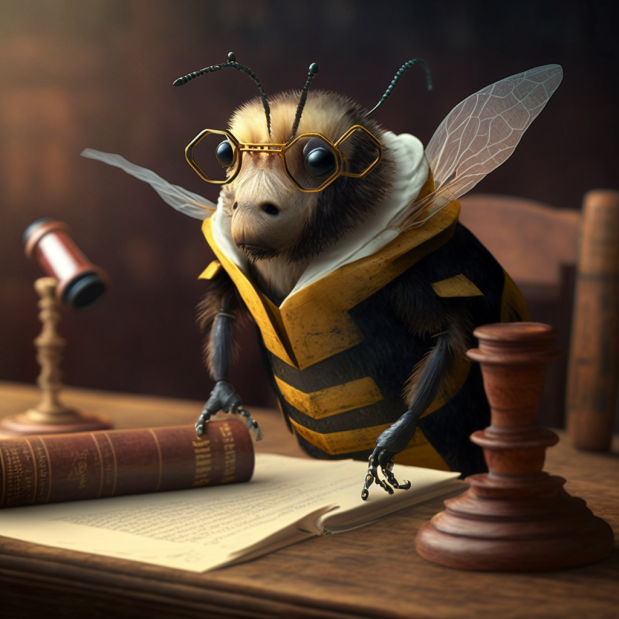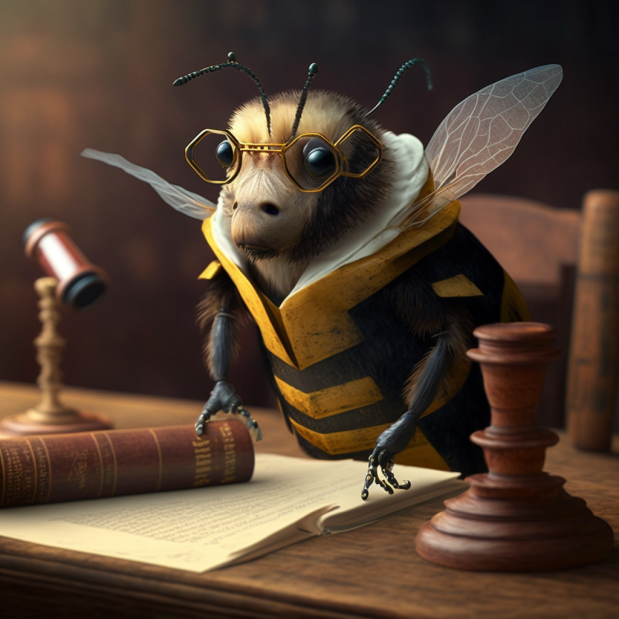
Living next to a beekeeper can be both fascinating and unnerving. The soothing hum of bees in your garden can bring a sense of tranquility, but what happens when their presence poses a threat? If you’re wondering about your legal options and the possibility of suing your beekeeper neighbor, this article will shed light on the matter. We’ll explore the potential concerns that may arise, discuss the factors that could determine liability, and provide insights into how to approach this situation amicably. So, if you find yourself buzzing with questions about the legal ramifications of having a beekeeper next door, read on to discover what options are available to you.
Understanding the Legal Aspect of Beekeeping
Beekeeping is a fascinating hobby that many people enjoy, but it’s important to understand the legal aspects surrounding this activity. Laws and regulations are in place to ensure the safety and well-being of both the beekeepers and their neighbors. In this comprehensive article, we will explore the laws and regulations governing beekeeping, as well as the rights and responsibilities of both beekeepers and neighbors.
Laws and Regulations Governing Beekeeping
Each jurisdiction may have different laws and regulations pertaining to beekeeping, so it’s crucial to familiarize yourself with the specific requirements in your area. Some common regulations may include the number of colonies allowed per property, setback distances from neighboring properties, and honeybee registration requirements. In some cases, a permit may be necessary before starting a beekeeping operation. Consulting with your local agricultural or environmental agency can provide you with the necessary information to ensure compliance.
Rights and Responsibilities of Beekeepers
Beekeepers have the right to pursue their hobby or business within the boundaries set by local laws. However, they also have important responsibilities to ensure that their bees do not pose a threat or nuisance to their neighbors. This includes properly maintaining their colonies, taking steps to prevent unwanted swarms, and managing their bees to minimize the risk of aggressive behavior or excessive disturbance. Beekeepers must stay informed about best management practices and be proactive in addressing any concerns raised by their neighbors.
Rights and Responsibilities of Neighbors
Neighbors have the right to enjoy their properties without unreasonable interference or harm caused by their beekeeper neighbors. This includes the safety and well-being of themselves, their families, and their pets. However, it is also important for neighbors to be considerate and understanding of the nature of beekeeping and the important role that bees play in the environment. Communication and dialogue between neighbors can often resolve many issues and prevent conflicts from escalating.
Determining the Basis for a Lawsuit
While most situations can be resolved through communication and understanding, there may be instances where legal action becomes necessary. When considering a lawsuit against your beekeeper neighbor, it’s important to understand the potential bases for a legal claim.
Property Damage and Loss
If your property has suffered damage or loss directly caused by the beekeeping activities of your neighbor, you may have a valid claim for compensation. This could include damage to structures, landscaping, or personal property. It is essential to document the damages thoroughly and gather any evidence that links the damage to the beekeeping activities.
Personal Injury or Allergic Reactions
Personal injury or allergic reactions caused by bee stings can be a serious concern. If you or someone on your property has suffered significant harm due to the beekeeping activities of your neighbor, you may consider filing a lawsuit for compensation. It is crucial to gather medical records, expert opinions, and other relevant evidence to establish the link between the beekeeping activities and the injury or allergic reaction.
Nuisance and Disturbance
Excessive noise, offensive odors, or other disturbances caused by beekeeping activities can disrupt the peace and enjoyment of your property. If your beekeeper neighbor’s actions persistently and unreasonably interfere with your quiet enjoyment of your property, you may have a valid claim for nuisance. It’s essential to gather evidence of the disturbances, such as records of dates and times, as well as any communication made to address the issue with your neighbor.
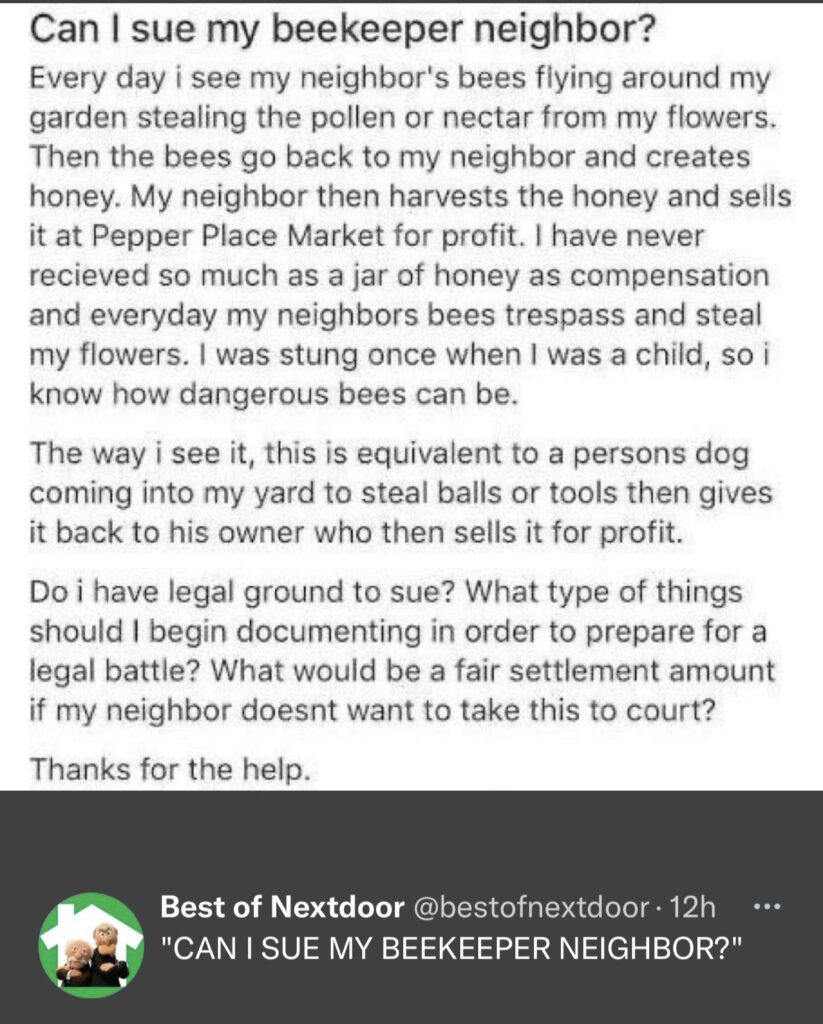
Collecting Evidence and Evaluating Damages
If you have determined that a lawsuit is the appropriate course of action, it is crucial to gather sufficient evidence to support your claims and evaluate the damages incurred. Depending on the basis of your lawsuit, different types of evidence will be necessary.
Documenting Property Damage or Loss
To establish a claim for property damage or loss, it is essential to document the extent of the damages thoroughly. Take detailed photographs or videos of the affected areas, making sure to note any specific damage. It is also helpful to gather any receipts, invoices, or estimates for repairs or replacement costs to provide an accurate evaluation of the damages.
Gathering Medical Records and Proving Allergic Reactions
If personal injury or allergic reactions are the basis of your lawsuit, it is crucial to collect medical records that clearly show the harm suffered and any treatment required. Seek professional opinions from medical experts who can establish a causal link between the beekeeping activities and the injury or allergic reactions. This evidence will be essential in establishing the damages caused by the actions of your beekeeper neighbor.
Recording Instances of Nuisance and Disturbance
To support a claim based on nuisance and disturbance, it is important to keep a record of any instances where the beekeeping activities of your neighbor have unreasonably interfered with your enjoyment of your property. Keep a log of dates, times, and specific details of each disturbance, including any communication made with your neighbor regarding the issue. This record will help demonstrate the persistence and unreasonableness of the disturbances.
Alternative Dispute Resolution
Before proceeding with a lawsuit, it is wise to explore alternative methods of dispute resolution. These processes can often be less costly, time-consuming, and adversarial than going to court. Here are some options to consider:
Mediation
Mediation involves a neutral third party who helps facilitate a conversation and negotiation between you and your beekeeper neighbor. The mediator aims to assist both parties in reaching a mutually agreeable resolution. This process encourages open communication, problem-solving, and finding common ground. Mediation can be particularly useful when there is a desire to maintain a positive neighborly relationship.
Arbitration
Arbitration involves presenting your case to an impartial arbitrator who listens to both parties and makes a binding decision. This process is less formal than a trial, but the decision reached by the arbitrator is final and legally binding. Arbitration can be a faster and less expensive alternative to court proceedings, but it does relinquish some control over the outcome of the dispute.
Negotiating a Settlement
Direct negotiation between you and your beekeeper neighbor is another way to resolve the conflict without going to court. It allows both parties to discuss their concerns, potential solutions, and reach a compromise that is mutually satisfactory. However, it is important to approach negotiations with a clear understanding of your rights and a willingness to find common ground.
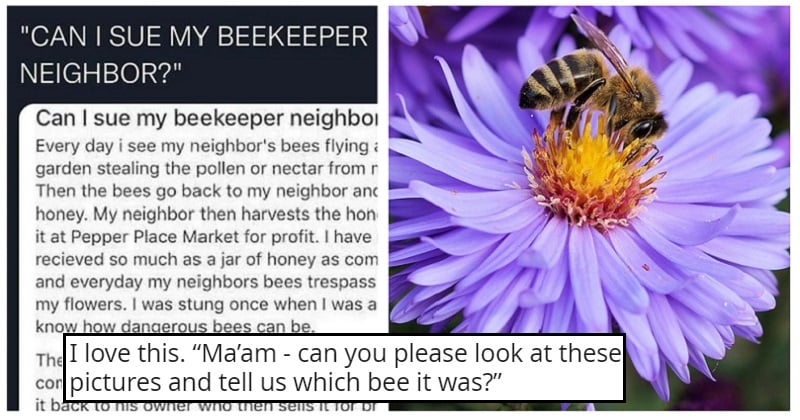
Filing a Lawsuit
If alternative dispute resolution methods have been exhausted or are deemed inappropriate for your specific situation, you may choose to proceed with filing a lawsuit. Here are the key steps involved in initiating a legal action against your beekeeper neighbor.
Choosing the Right Court
Identify the appropriate court where you should file your lawsuit. It is essential to follow the jurisdictional rules and determine whether you should file in small claims court, state court, or federal court, depending on the nature of your claims and the damages sought. Consulting with an attorney can help ensure you choose the correct court for your lawsuit.
Drafting a Complaint
A complaint is a legal document that outlines your claims against your beekeeper neighbor. It should clearly state the facts of the case, the legal basis for the lawsuit, and the specific relief or damages sought. While it is possible to draft a complaint yourself, it is advisable to seek legal counsel to ensure all necessary elements are included and the document is properly formatted.
Serving the Complaint to your Beekeeper Neighbor
Once the complaint has been drafted, it must be officially served to your beekeeper neighbor. This ensures that they are properly notified of the lawsuit and have an opportunity to respond. The method of service may vary depending on the jurisdiction, but it typically involves delivering a copy of the complaint to the defendant either in person or through an authorized method such as certified mail.
The Legal Process
After filing a lawsuit and serving the complaint, there are several stages in the legal process that will determine the outcome of your case. It’s important to understand these stages and the roles of each party involved.
The Defendant’s Response
After being served the complaint, your beekeeper neighbor typically has a specific period to respond. They will file a written answer admitting or denying the allegations, raising any defenses, and potentially filing counterclaims against you. This response sets the stage for the rest of the legal process.
Discovery Phase
During the discovery phase, both parties gather evidence and information relevant to the case. This may involve exchanging documents, submitting written questions (interrogatories), and taking depositions of relevant witnesses. The goal is to uncover all the facts and evidence that will be presented at trial.
Pre-trial Motions
Before the trial date, either party may file pre-trial motions to resolve certain issues or narrow the focus of the case. These motions may include a motion to dismiss, a motion for summary judgment, or a motion to exclude certain evidence. The judge will review these motions and issue rulings based on their merits.
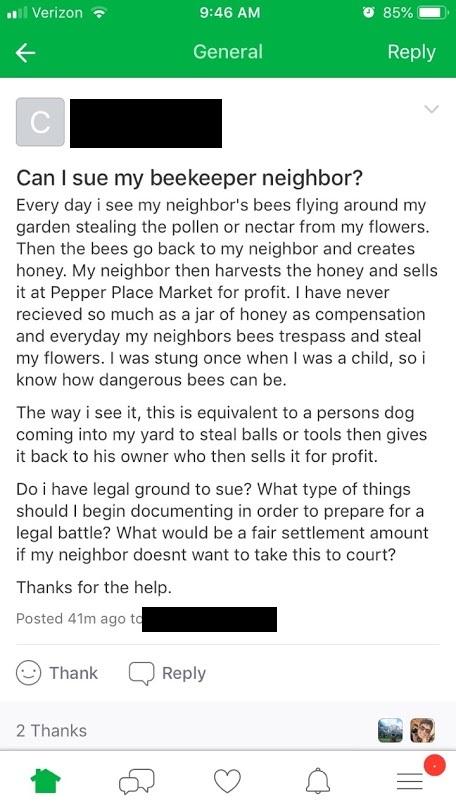
Going to Trial
If the dispute cannot be resolved through alternative dispute resolution or pre-trial motions, the case will proceed to trial. Here’s what you can expect during this process.
Jury Selection
In cases where a jury trial is requested or required, both parties have an opportunity to select a jury from a pool of potential jurors. A fair and impartial jury is essential for a just resolution of the case.
Presenting Evidence
During the trial, each party will present their evidence, including documents, photographs, and witness testimony, to prove their claims and defend against the opponent’s claims. It is crucial to be well-prepared, organized, and familiar with the rules of evidence to effectively present your case.
Cross-Examination
Both parties have the opportunity to cross-examine witnesses presented by the opposing side. This allows for challenging the credibility of witnesses, exposing any inconsistencies or biases, and clarifying any unclear testimony.
Potential Outcomes and Remedies
After presenting all the evidence and arguments, the judge or jury will make a decision. There are a few potential outcomes and remedies available in beekeeper neighbor disputes.
Compensatory Damages
If the judge or jury determines that your claims are valid and you have suffered damages, you may be awarded compensatory damages. These damages aim to restore you to the position you were in before the harm occurred financially.
Injunctive Relief
Injunctive relief is a court order that requires certain actions to be taken or prohibited. In beekeeper neighbor disputes, injunctive relief may be sought to stop specific beekeeping practices, ensure compliance with local laws, or prevent further harm or nuisance.
Incurring Legal Costs and Attorney Fees
It is important to consider the potential financial costs of pursuing a lawsuit. While you may be entitled to recover attorney fees and certain court costs if you win, there is no guarantee. It is advisable to discuss the potential costs with an attorney before proceeding.
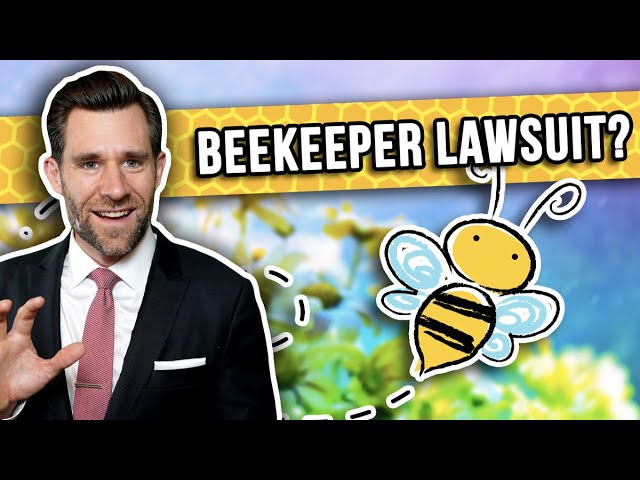
Appealing a Decision
In the event that you are dissatisfied with the outcome of your lawsuit, you may have the option to file an appeal. However, appealing a decision is a complex and lengthy process that should be carefully considered. Here are the key steps involved in appealing a decision.
Grounds for Appeal
To have a valid appeal, you must identify and establish legal grounds for challenging the decision. This could include errors in the application of the law, improperly admitted evidence, or erroneous jury instructions.
Filing an Appeal
The process for filing an appeal varies among jurisdictions. Typically, you will need to file a notice of appeal within a specified period after the judgment is entered. It is important to adhere to the procedural requirements and timelines to ensure your appeal is not dismissed.
Appellate Court Process
Once the appeal is filed, the appellate court will review the trial court’s decision and the arguments presented by both parties. The appellate court will consider the legal issues, review the record of the trial proceedings, and determine whether any reversible errors were made. The appellate court may uphold the decision, reverse it, or order a new trial.
Considering Other Options
While the legal process can be expensive, time-consuming, and emotionally draining, there are other options to explore before resorting to a lawsuit. Here are a few alternatives to consider.
Community Mediation Programs
Many communities offer mediation programs specifically tailored to neighbor disputes. These programs provide a neutral mediator who helps facilitate communication between you and your beekeeper neighbor to find mutually agreeable solutions. Community mediation can often bring about more satisfactory and long-lasting outcomes without the need for going to court.
Seeking Local Ordinances or Bylaws
Researching the local ordinances or bylaws in your area is essential in understanding the regulations that govern beekeeping. If your beekeeper neighbor is in violation of any local laws, the relevant authorities should be notified to address the issue. Understanding the legal framework and engaging with local authorities can often resolve conflicts without resorting to legal action.
Moving or Relocating
If the disputes and conflicts with your beekeeper neighbor are unresolvable or significantly impact your quality of life, you may consider exploring the possibility of moving or relocating. While this may not be an ideal solution for everyone, sometimes a fresh start in a different location can be the most effective way to resolve ongoing issues.
In conclusion, understanding the legal aspect of beekeeping is crucial when dealing with conflicts or disputes involving your beekeeper neighbor. By familiarizing yourself with the laws and regulations governing beekeeping, knowing your rights and responsibilities, and exploring alternative dispute resolution methods, you can navigate potential legal issues with greater confidence and achieve a resolution that is fair and satisfactory for all parties involved. Communication, understanding, and a willingness to find common ground are key to maintaining positive relationships with your beekeeper neighbors and fostering a harmonious community.
